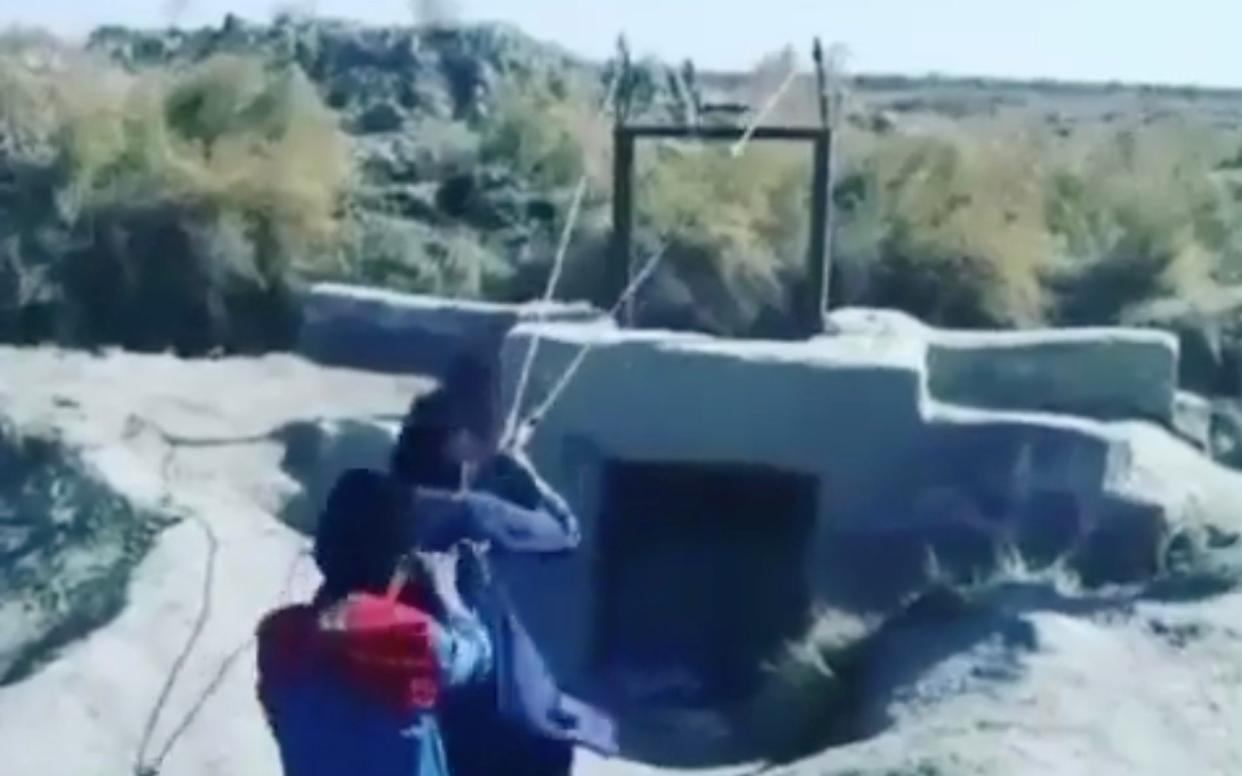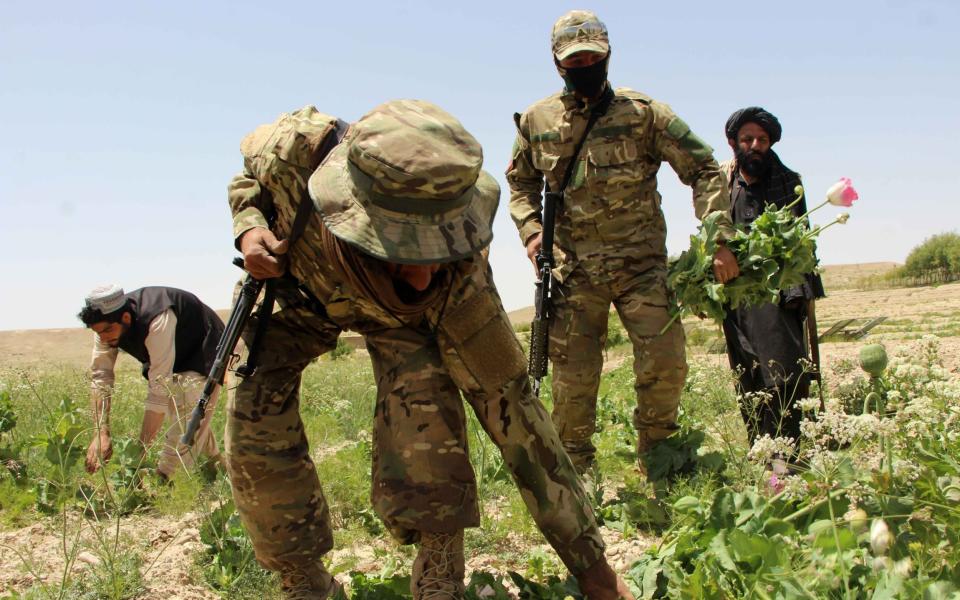Watch: Afghan farmers catapult opium across border to beat Taliban crackdown

Along a barren, dusty road on Afghanistan’s border with Iran, slingshots line the sand.
For years, they have propelled drugs from western Nimroz province across the border to Iran’s Sistan and Baluchestan province.
But now, in the wake of the Taliban’s crackdown on opium production, the use of the catapults has increased, especially under the veil of night.
“Moony nights are advantageous,” Jabar, a frequent visitor to the border for firing drugs, tells The Telegraph. “It makes it easier for people on the other side to locate them.”
Drug-launching catapults line the road
“The Taliban have intensified drug-related arrests, that’s why we now conduct our operations under the cover of darkness and use a different location every night, to evade any confrontations with them,” the 31-year-old adds.
The border in some areas is guarded with trenches and electric fences, meaning the catapults come into their own.
“With each launch, around half a kilogram travels 300 to 400 metres into Iran,” he explains. “While these nights are primarily focused on opium, I do have a contact who specifically requests heroin which he sends to Turkey.”
Afghanistan’s new rulers have intensified a nationwide crackdown on drugs and poppy farms ahead of the approaching harvest season, which has sparked unprecedented protests. The Taliban has warned of military deployment to suppress the public demonstrations.
The unrest erupted earlier this month when the Taliban’s anti-narcotics forces began destroying poppy fields in Badakhshan province, part of sweeping ideological changes ordered when they retook power.
Packages fired over the border
Videos circulating on social media show residents chanting slogans against the reclusive Taliban supreme leader, Mullah Hibatullah Akhundzada, who has ordered a ban on poppy cultivation.
Prices have also surged dramatically since the Taliban took control of Afghanistan in August 2021, skyrocketing from around £30 per kilogram to between £800 and £1,000.
The sharp increase has prompted many farmers across the country to cultivate poppies in secret, either within their private gardens or in remote villages.
Ahmadvali, one of the farmers, has transformed his once flourishing vineyard in a remote village in western Farah into a poppy farm shielded from the Taliban’s eyes by towering walls surrounding it.
He assigns two of his sons to be on lookout around the farm in case the Taliban become suspicious.
The 42-year-old needs just 10 more days to reap the bountiful harvest of opium.
“I had several farms in Helmand and Kandahar but they [the Taliban] destroyed all of them,” he tells the Telegraph.
“Then I flattened my vineyard here, built a big wall around it and transformed it into an opium farm,” he says.
“I already have some opium from last year, but I’m hesitant to sell it. It’s becoming increasingly rare, and the prices are going up by the day. I just need around 10 more days before I begin harvesting if I hold on to it until then,” he adds.
Protests against crackdown on poppy production
However, Taliban officials speaking to The Telegraph said that a significant aspect of the crackdown was to intentionally inflate prices, benefiting top officials who possess secret farms or stored opium, for “further enriching themselves”.
“The entire operation is geared towards driving prices up,” says a local Taliban official in western Herat.
“Many of them, particularly those connected to the establishment in Kandahar, have amassed hundreds of kilograms of stored opium.
“Just two years ago, my commander owned nothing but a broken motorcycle, yet now he has two Land Cruisers and a lavish house.
“They’re growing wealthier with each stroke of the crackdown and with each poppy they destroy,” he says.
He recalls a raid on the house of a businessman inside Herat city last month, when the officials discovered more than 120kg of opium.
“But the guy simply made a phone call to Kandahar, promised 50kg to a high-ranking official, distributed 20kg among my commanders, and managed to evade any consequences.
“He retained 50kg only due to his connections with high-ranking individuals, otherwise, they would have seized all of it, adding it to their own stockpiles and awaiting further price escalations,” he explains.

Afghanistan held the title of the world’s largest opium producer until the Taliban enforced a ban on cultivation in early 2022, ceding the top position to Myanmar.
The country’s opium production has plummeted by over 90 per cent, according to a report by the United Nations, as Taliban enforcers move from farm to farm destroying crops and punishing offenders.
Cultivation in Helmand province, which once produced around four-fifths of Afghanistan’s opium and was the centre of British operations in the country from 2006 to 2014, fell to around 2,500 acres last year, down from 320,000 the year before.
But not everyone in Helmand has had their farm destroyed.
Haji Gholam Yahya, 46, uses a different strategy to conceal his poppy field in Helmand’s Sangin district. He surrounded it with tall trees and grew wheat around it as an additional cover.
He also enjoys having his younger brother in charge of destroying farms in their village.
“They don’t visit the village frequently, but when they do, my brother, who is a member of the Taliban, helps me in keeping the farm alive,” he explains, emphasising the crucial role his brother plays in safeguarding his illicit enterprise.
“I give him opium and money sometimes to thank him,” he adds. “The market is great. Opium is black gold.”
“Previously the other government and now the Taliban, have been telling us to cultivate wheat. It is priced at 20 Afghanis per kilogram (15p) and opium is around 85,000 (£800). I leave it to you to judge,” he says.
He intends to send some of his opium to his cousin in western Nimroz province, who will then smuggle it into neighbouring Iran, where prices have also surged.
A significant portion of the opium and heroin produced in Afghanistan is trafficked to Iran, serving as a gateway to Europe.
Basir, a 29-year-old who has a “kitchen” for producing heroin near the Iranian border, has escalated his opium smuggling operations to Iran in response to the even higher prices in that market.
“It’s been a few months since I’ve sent large quantities of heroin because opium is easier to traffic and now more profitable,” he explains.
“Opium has become very rare to find but has had no effect on our heroin production, we just halted sending heroin for now as there is a better market for opium,” he says.
Travelling with two armed men, he takes around 20kg of opium each week to the border, then his Iranian contacts take over the job.
He receives payment in US dollars at the border, after that it’s the responsibility of his Iranian counterparts to distribute it within Iran and pass it on to their Turkish counterparts for the European markets.
“We need to keep people happy in their hard times wherever they are,” he says with a big laugh. “The Taliban made our job a bit harder.”

